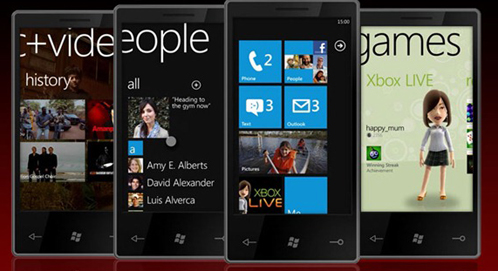venturebeat:观察家对微软重新称雄科技领域的三点建议
微软最近好事不断,Windows Phone 7刚登台就争夺了许多眼球,体感游戏控制技术Kinect也有望在年底前脱销,看来微软是时候与Apple、谷歌一争高下了。
这个良好的开端无疑是一场及时雨,因为微软主要的实力和营收来源—-Windows操作系统,目前在多个领域正遭遇前所未有的挑战。首先,现在的手机更加智能化,微软如果不尽快从苹果iPhone、谷歌Android的夹击中突围,就很难在手机领域立足;其次,操作系统的触角已经抵达网络电视等其他连接设备,Android和iOS在这一领域已经早有行动。最后,互联网已变得更加高速,人们对云储存的需求也在扩大,网页应用更将受热捧,这一点也让Windows操作系统显得落伍。
那么,微软在这三个领域应如何巩固自己的势力?
手机平台
WP7出道虽晚,却也备受关注,虽然不免一些小瑕疵(比如遗漏了复制/粘贴功能),但总体上仍比旧版的Windows Mobile要进步许多。
WP7究竟能否赶上iOS、Android的市场份额,现在还不宜过早下结论,但也不能忽视它确实有一些明显的优势,比如说绑定了强大的微软办公软件,游戏也是它的一个杀手锏。
在iPhone平台的App Store中,游戏仍然是最热门的应用类型。Windows Phone上最欢迎的10款付费应用中,多数是XBox Live游戏,这一点倒并不令人意外,毕竟iOS和Android已经拉拢了大部分第三方手机游戏开发商,微软只能靠自产自销,打造独具特色的应用商店Windows Phone marketplace。这里面就有一个关于鸡生蛋,蛋生鸡的悖论:如果Windows Phone没有足够多的应用支持,用户就不会接受这个平台;而如果没有足够多的用户,开发商也不愿意为这个平台编写应用。越多用户使用运行于Windows Phone的应用,微软就越容易说服开发商面向该平台投放产品。
Windows Phone的游戏确实比iPhone和Android游戏更有优势,因为该平台还支持用户与XBox 360或PC等其他平台游戏玩家一起决战。微软已经培养了一群XBox 360铁杆粉丝,对这些玩家来说,绑定了XBox Live功能的WP7手机实在很有吸引力。但也并不能说Windows Phone已经完全脱险,因为这个平台的用户数量可能难敌休闲游戏玩家,要知道痴迷《愤怒的小鸟》(Angry Birds)这类休闲游戏的玩家远多于《星环》(Halo)等硬核游戏玩家。
不过在发展战略上,微软WP7比iPhone更加开放,又比Android略为保守一点。这种半开放路线比较容易招揽手机硬件制造商(比如三星就已准备在明年生产Windows Phone手机),也因此更有利于追赶苹果iPhone的市场占有率。与此同时,微软在手机技术规范上又比Android更严格,这样也有助于打造更优质、稳定的手机平台。
网络电视
操作系统已经不再局限于PC或手机平台,家用电器是操作系统创新发展的下一站,网络电视便是其中首选。谷歌和苹果这两者同样已经在这一领域捷足先登。
苹果和谷歌现在都正不遗余力地向家用电器进军,试图将手机操作系统市场的成功模式推向这一新领域。新登场的Apple TV采用的就是和iPhone、iPad、iPod Touch一样的iOS系统,尽管有关传言不绝于耳,但苹果至今也还没有发布面向Apple TV的专门应用,Google TV也同样没有动静,并没有推出专用的Android应用和游戏产品。
虽然苹果和谷歌都已在这个一贯难以攻克的市场施展拳脚,不过微软却也不乏自身优势,它已经掌握了一批XBoX家庭游戏机用户。除了游戏之外,XBox还可以提供Netflix和Last.fm等其他类型的应用服务。只要市场营销不出岔子,XBox完全有可能取代Apple TV或Google TV。已有传言称,微软正在计划面向XBox 360平台推出网络电视服务。
另外,微软最近还正火热招聘银光(Silverlight)应用开发者,面向XBox 360及绑定WP7的XBox Live开发产品,这种迹象表明,微软确实准备将Windows Phone手机应用推向XBox平台。微软已经具有规模庞大的开发商基础,这些开发商对微软开发技术工具也已经是驾轻就熟。如果微软可以说服开发商为Windows Phone编写应用(该平台现已聚集了15000名开发商),并且这些应用还能方便快捷地跨平台移植到XBox上,那么微软在网络电视市场无疑更将领先一步。
Google TV允许任何制造商面向自己的平台生产电视和机顶盒,而XBox唯一的硬件制造商只有微软本身。如果要在家庭娱乐市场上更上一层楼,微软最好采用与Windows Phone类似的模式,允许更多独立制造商生产采用微软操作系统的电视和机顶盒。
网页应用
谷歌90%的营收来源于广告,它向第三方免费提供办公应用软件(Google Docs)和操作系统(Android以及即将发布Chrome OS),这一点让微软特别头疼。几乎所有的谷歌应用都是基于网页技术,用户不需要在电脑上安装谷歌软件就能运行这些应用。微软则与此大相庭径,它有相当一部分营收得益于Windows操作系统和Office办公软件,这两者价格不菲,而且还会占用大量的硬盘空间,只有安装软件才能使用全套功能。
这种局面对微软非常不利,它的网页应用开发技术远逊于谷歌,即使它真的擅长此道,它所开发的网页应用也很可能与本身的电脑软件自相残杀。
微软面临的另一个挑战是,平板电脑、电子阅读器和网络电视等新型平台的不断衍生。
如果根据摩尔定律,数据处理速度和存储容量一直在呈指数增长,那就意味着像手机这种小型设备的功能将更加强大。分析师们也因此预测,PC、手机、数码相机、掌上电脑等不同的平台迟早会融合成一个统一的平台,并将这种现象称为数字融合。
不过,摩尔定律没有预测到的结果就是,这一领域并没有出现融合的趋势,反而催生出了多种个性化平台。处理器功能及技术的进步,新应用服务的产生,造就了多种个性化平台同存的局面。
与这种现象共生共存的是,用户出行更加频繁,媒体产品需求扩大,人们对移动平台的内存和操作便捷性提出了新的要求。谷歌的网页应用不存在这两种问题,因为它的大多数用户内容都与云系统同步,通过互联网浏览器就能运行,不需要占用多少本地内存,操作也更为方便。谷歌通讯录、文档应用、电子邮箱就是这方面的典型。
苹果在这方面的情况就不太妙了,它是这三个科技巨头中力量最薄弱者。部分原因是苹果笃信质量上乘、功能强大的原始应用必将胜出,另一个原因是苹果主要靠基于本地储存的手机、iPad和电脑创收。这也正是我无视业内传言,坚信苹果不会发布基于云技术的iTunes的原因。更何况苹果也不是非如此不可,只要它的系统还能与硬件平台无缝兼容,对用户来说,苹果还会很有吸引力。
在这种情况下,微软只能再次选择中间路线。与谷歌不同,微软产品并不完全基于网页技术,但又不像苹果那样可以将硬件平台与软件产品完美地融合在一起。
微软仍将生产它的原始办公应用软件,但现在也提供一个在线免费简装版本。这个策略对扼制谷歌极为重要,毕竟Google Apps现在正不断从微软手中抢夺Office用户。这款在线Office应用会危及微软自身的营收吗?也许会。但它也可以吸引用户购买功能更齐全的Office工具包,同时又能防止他们投向Google Docs的怀抱。
Windows Phone绑定Office和XBox Live功能,是微软挽留用户的一种策略,只要微软可以提供与硬件平台无缝兼容的Windows Phone、XBox、Zune等服务,它就可以守住客源。
虽然微软声称已经拥有堪与谷歌匹敌的Live.com门户网站、在线Office、Hotmail和内线的Messenger等基于网页技术的服务,不过这些服务仍然有待改进,在兼容技术上也远不如Google做的到位。另外,虽然Hotmail已经拥有相当规模的支持者,但大部分用户都是Gmail的“准用户”,而且在这个Facebook和谷歌当道的年代,选择Gmail的年轻用户更多,Hotmail要彻底打败Gmail实非易事。
结论
姑且无视年轻一代更支持谷歌、Facebook、苹果这个客观事实,微软自身仍然不免一场硬战。它的手机市场份额很有限,硬件与软件的兼容并不理想,网页应用的运行性能也比较落后,这些都是微软难以克服的硬伤。
此外,微软所采用的中间路线—-它的手机操作系统既不如谷歌开放,又不像苹果一样保守;它的软件既非苹果一样高度依赖硬件平台,又不像谷歌那样完全基于网页技术。所以这种策略也有可能让微软成为一个特别中庸,却没啥特长的品牌。
更重要的是,微软不能再对别人亦步亦趋,而应该开始引领潮流。虽然微软从来没有推出自己的平板电脑,但它早在几年前就提出了平板电脑的概念;它还对掌机游戏进行创新,打造了XBox Live在线游戏平台,现在又首创了体感游戏控制技术Kinect。话说回来,虽然微软并不缺乏创新理念,却独独在自己最在意的领域—-手机计算机技术和应用软件上处于下风。
对微软帝国来说,2010年应该是极具历史性意义的一个时期,如果微软的Windows Phone、XBox和Windows 7能保持现在的发展势头,它的网页应用能吸引更多用户,相信微软仍将继续在这个科技领域保持雄风。(本文为游戏邦/gamerboom.com编译,转载注明来源:游戏邦)
Is Microsoft readying for a surprise comeback?
Microsoft is on a roll: Its newly launched Windows Phone 7 is gaining momentum, and Kinect, its motion controller response to the Wii, could very well sell out before the end of the year. If there was ever a time for Microsoft to get back on its feet and stand shoulder to shoulder with Apple and Google, this would be it.
This positive buzz comes at a time when Microsoft sorely needs it. Microsoft’s major source of power and revenue – the Windows operating system – is under an unprecedented threat on several fronts. First, as mobile phones become smarter, the Windows franchise will lose its dominance unless Microsoft can find a way to compete with Apple’s iPhone and Google’s Android. Second, as operating systems find their way into other connected devices such as Internet TV, Google’s Android and Apple’s iOS are getting all the buzz. Third, as the Internet becomes speedier and demand for cloud-based storage increases, web apps will become even more popular, making the Windows operating system even less relevant.
So what’s Microsoft doing to regain footing on these three fronts?
Mobile
Despite arriving late to the party, Windows Phone 7 has received strong reviews so far, and while there are a few glaring omissions (such as the missing copy/paste function), on the whole it is a great leap forward from the antiquated Windows Mobile platform.
It’s too early to tell whether Windows Phone 7 can catch up in a market dominated by iOS and Android, but it has some clear advantages. Tighter integration with Microsoft Office, still the most dominant productivity suite, is one of them. Gaming is another.
Gaming remains the most popular category in the iPhone app store. It’s no surprise then that most of the top 10 Windows Phone paid apps are XBox Live games. With most third-party mobile game developers already committed to iOS and Android, Microsoft has had to develop several games in-house to kick start Windows Phone’s marketplace. This was essential to circumvent the chicken and egg problem: Users would not like the Windows Phone unless there were enough apps, and developers would not write apps unless they thought there were enough Windows Phone users. As more users start using mobile apps on the Windows Phone, it will be easier for Microsoft to convince developers to build apps for the platform.
Games on the Windows Phone do have a notable advantage over iPhone and Android games. Users will soon be able to play games with players on other platforms such as XBox 360 or the PC. Microsoft already has a passionate following on XBox 360, and these XBox gamers are more likely to be attracted to Windows Phone 7 because of its tighter integration with XBox Live. The risk, however, is that the Windows Phone might not win over casual gamers. Casual gamers who indulge in games like Angry Birds easily outnumber hard-core gamers who revel in the likes of Halo on XBox.
Strategically, Microsoft’s Windows Phone is more open than the iPhone, but less so than the Android. This semi-openness could prove vital as more hardware manufacturers embrace the Windows Phone (Samsung, for instance, will focus on the Windows Phone in the coming year) and therefore help it catch up with the iPhone. At the same time, Microsoft is keeping tighter control of phone specifications than the Android. This could result in a higher quality and more stable platform.
Internet TV
Operating systems are no longer housed by just PCs and mobile phones. Home devices are the next front for innovation and opportunity, and the Internet TV market is of utmost strategic significance. Not surprisingly, Google and Apple are making big plays there.
Apple and Google are both leveraging their success in the mobile operating system market to propel their operating systems into homes as well. The new Apple TV, for example, uses iOS, Apple’s operating system behind the iPhone, iPad, and iPod Touch. However, despite rumors, Apple hasn’t launched iOS apps on the Apple TV yet, and Google TV has not launched full-blown Android apps and games either.
While Apple and Google try to enter a market that has traditionally been tough to crack, Microsoft already has a passionate base of users with XBox consoles at home. In addition to games, XBox already offers popular apps such as Netflix and Last.fm. If marketed well, there is no reason why XBox cannot be an alternative to Apple TV or Google TV. Indeed, rumor has it that Microsoft is planning to launch television service on the XBox 360.
In addition, Microsoft’s recent push to hire Silverlight app developers for the XBox 360 and XBox Live’s integration with the Windows Phone indicate that Microsoft is serious about bringing Windows Phone apps to the XBox. Microsoft has a large existing developer base familiar with its development tools and technologies. If it can convince developers to write apps for the Windows Phone (more than 15,000 are already on board), and if their apps can be easily cross-deployed on XBox, Microsoft will have a leg up in the Internet TV market.
Unlike Google TV, which any manufacturer can license for TVs and set-top boxes, XBox is currently only manufactured by Microsoft. In order to make further inroads in the home entertainment market, Microsoft might be better off taking a similar strategy to its Windows Phone model by letting independent manufacturers license its operating system for their TVs and set-top boxes.
Web-based apps
Google, which makes more than 90% of its revenue from advertising and gives away things such as productivity applications (Google Docs) and operating systems (Android and soon Chrome OS) for free, continues to be a headache for Microsoft. Almost all of Google’s applications are web-based; users do not need to install Google software on their laptops to use the applications. Contrast that with Microsoft, which earns the majority of its revenue from Windows and Office, both of which are expensive, take up a significant chunk of the hard drive, and must be installed to achieve full functionality.
This is a precarious situation for Microsoft. Unlike Google, Microsoft has little expertise in developing web-based apps, and even if it did, its web-based apps would cannibalize its desktop software.
Another challenge for Microsoft is presented by the trend towards proliferation of new form-factor devices such as tablets, e-readers, and Internet TV boxes.
Moore’s Law, which says that processing speed and memory capacity are improving at roughly exponential rates, means that smaller devices like phones will become more powerful. This has led analysts to predict that several devices such as PCs, mobile phones, digital cameras, and PDAs will eventually converge into a single device – a phenomenon known as digital convergence.
However, an unexpected consequence of Moore’s Law has been multiplication (and not convergence) of specialized devices. As processors become more powerful and as technologies advance, newer applications emerge, resulting in the aforementioned specialized devices.
This phenomenon, along with increased consumer mobility and media consumption, has resulted in increased demand for storage and accessibility. Google’s web-based apps provide a solution for both. Since most of its user content is synced with the “cloud” and thus can be accessed from any Internet browser, users benefit from better accessibility and less need for local storage. Google contacts, documents, and email are prime examples.
Apple, on the other hand, has the weakest web-based portfolio of the three tech giants. This is partly because Apple believes in the quality and power of native apps, and partly because Apple makes money from local-storage-based phones, iPods, and laptops. This is also why I don’t think Apple will launch a “cloud based” iTunes anytime soon despite the rumors. It almost doesn’t have to. If it can make the syncing between devices wireless and seamless, it will continue to attract users.
Microsoft’s response to the threat has been again to opt for the middle road. Unlike Google, Microsoft’s offerings are not purely web-based. But Microsoft doesn’t have as tight an integration between its devices and software as Apple does.
Microsoft continues to offer its powerful native Office software but now also offers a free but limited version online. This is imperative to compete with Google, whose free Google Apps continue to lure users away from Office. Will online Office cannibalize some of Microsoft’s revenue? Perhaps. But it could also entice users to buy a more powerful Office suite and keep them from switching to Google Docs at the same time.
The newly launched Windows Phone and its integration with Office and XBox Live presents another opportunity for Microsoft to keep its users hooked to its devices. If Microsoft can offer seamless syncing between its devices – Windows Phone, XBox, and Zune – it can retain its user base.
While Microsoft can now claim to have web-based offerings comparable to Google’s – the Live.com portal, online Office, Hotmail, and inline Messenger are some examples – its offerings still seem like works in progress and are not as seamlessly integrated as Google’s. Moreover, while Hotmail has a sizeable following, most of its user base is “pre-Gmail”, and it will be a challenge to win over Gmail users and the younger generation that has grown up in Facebook and Google times.
Bottom Line
Even putting aside the fact that the younger generation is generally more attracted to Google, Facebook, and Apple, Microsoft has a hard battle ahead. Its weak market share in the mobile market and loose integration and generally slower performance of web-based apps are handicaps that will be hard to overcome.
Additionally, its middle-of-the-road strategy – its mobile phone OS is not as open as Google’s but not as closed as Apple’s, and its software is not as device-centric as Apple’s but not as web-based as Google’s – could position the company as a “jack of all trades, master of none.”
But most importantly, Microsoft needs to stop playing catch-up and start leading. To give it due credit, Microsoft introduced tablets several years ago, even though its tablets never took off. It has also brought innovation to console gaming by introducing XBox Live (with the ability to play with other gamers around the globe) and is now leading again with the introduction of Kinect, a gesture- and motion-based sensor. However, Microsoft has been too late to market in several areas where it matters most – mobile computing and apps.
2010 could go down as one of the most exciting times in Microsoft’s recent history. If Microsoft can keep up the momentum behind its Windows Phone, XBox, and Windows 7, and attract a sizeable user base to its web-based apps, it has a real shot at staying strong and relevant for a very long time.(source:venturebeat)












































 闽公网安备35020302001549号
闽公网安备35020302001549号